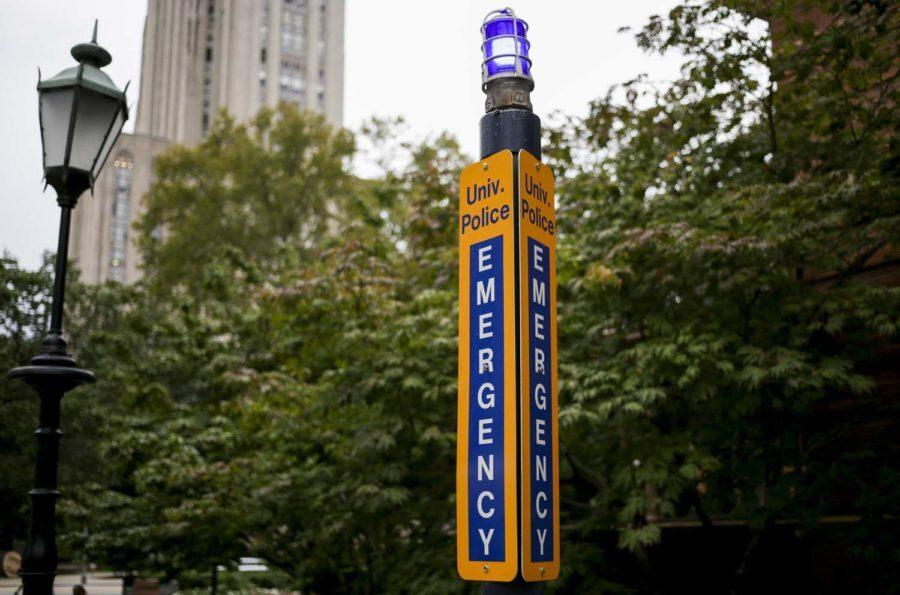SAFE Peer Educators teach students about sexual violence, survivor support


An emergency blue light phone on campus.
The Sexual Assault Facilitation and Education peer educators are a group of trained Pitt students who teach other students about healthy relationships, sexual violence and survivor support.
Julia Vroman said having students lead these discussions allows for a more well-rounded understanding of the subject in a “comfortable and supportive” setting.
“Trying to educate people on sexual violence, no matter what age, is hard,” Vroman, a senior psychology major, said. “It obviously isn’t a fun topic and it is really difficult to engage people, particularly adolescents and busy young adults.”
SAFE is under Pitt’s Office of Sexual Violence Prevention and Education. It holds workshops on a number of categories and topics including bystander intervention, survivor support, consent and healthy relationships. SAFE meets biweekly and each member goes through orientation and training before working as an educator.
SAFE holds these workshops for different clubs, student organizations, Greek life and first-year programs, but Vroman said they’re trying to have more events geared towards the entire student body.
“We have had two really successful events where we focus on sexual violence prevention and education while weaving in pop culture,” Vroman said. “We recently held a Beyonce self-love event [Feb 13] and held a 1989 Taylor’s Version themed event back in November. We are partnering with other organizations like Planned Parenthood and hosting some upcoming events to look out for.”
Aarushi Pant, a senior computational social science major, said the removal of a power dynamic also helps students open up.
“Peer-to-peer education is so important because you are able to connect with the people you are working with more easily,” Pant said. “There isn’t a distinct power dynamic like there might be when a professor or an expert comes to talk to students and it’s clear that they have years of education and expertise on the topic.”
According to the American Psychology Association, campus sexual assaults make up 43% of all crimes on college campuses. Women are also more likely to experience campus sexual assaults, as 25% of female college students have reported being survivors. The APA also estimates that 90% of campus sexual assaults go unreported. So an organization like SAFE is very important to have on a college campus, according to Pant.
“Sexual violence on college campuses is unfortunately so rampant, and a lot of students just don’t know what it looks like, what the warning signs are, how to support a friend who experienced something or what resources they can access when they need something,” Pant said. “SAFE is here to provide you with that information to eradicate sexual violence on college campuses.”
During their workshops, SAFE offers many resources to survivors. Alexa Miller, a senior public health and gender, sexuality and women’s studies major, said these resources create a safe environment.
“By fostering conversations and raising awareness about sexual assault and consent, SAFE contributes to a cultural shift on campus, promoting attitudes and behaviors that prioritize respect, consent and accountability,” Miller said. “Additionally, we offer support and resources for survivors of sexual assault and relationship violence, creating a safe and supportive environment for those who have experienced harm.”
Miller said she became a peer educator to help cope with her own experiences as a survivor.
“SAFE has been an important part of my own healing journey as a survivor,” Miller said. “I can genuinely say that it has been one of the best experiences of my college career. I have made lifelong friends, gained valuable skills and truly feel that we have been able to make a difference on campus.”
Pant joined because they wanted to be a part of something they deemed important.
“I joined SAFE because sexual violence prevention has always been a topic I’m passionate about,” said Pant. “I feel that SAFE’s mission to educate, empower and uplift students by educating them on topics like consent and healthy relationships is so powerful and something I wanted to be a part of.”
Vroman said SAFE’s goal is to provide students with a nonjudgmental space where they can share their voices, ask questions and learn how to live their “best and safest lives” at Pitt. .
“Having these peer-led organizations is essential to making sure that rates of sexual violence decline and that the study body feels that they are spending their time on a campus that values consent, their safety and autonomy,” Vroman said.
Recent Posts
‘He’s off to a much faster and better start’: Republicans reflect the second Trump administration’s first two months
Since Inauguration Day Trump’s second term has caused division amongst young Americans. Despite these controversies,…
Who Asked? // Why do we accept bad treatment from people?
This installment of Who Asked? by staff writer Brynn Murawski attempts to untangle the complicated…
What, Like It’s Hard? // Lean on your people
Contributing editor Livia LaMarca talks about leaning on your support networks and gives advice on…
Note to Self // Hot Girl Summer
In the sixth edition of Note to Self, Morgan Arlia talks about how she is…
A Good Hill to Die On // Down to Date and Time
In the latest version of “A Good Hill to Die On,” staff writer Sierra O’Neil…
‘Dress for Success: Closet to Career’ alleviates the stress of building a professional wardrobe
As the end of the spring semester rapidly approaches, many Pitt students find themselves in…

